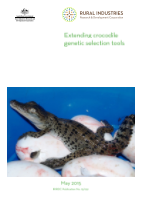Industry placemat: Crocodile
This placemat serves as a resource for those interested in the emerging crocodile industry. Within this placemat, you’ll find essential fast facts alongside the fundamental...

51 pages
Published: 29 May 2015
Author(s): Finger Jr., John W., Thomson, Peter C., Bagal, Ujwal R., Moran, Christopher, Glenn, Travis C., Miles, Lee G. , Khatkar, Mehar S. , Adams, Amanda L., Benedict, Suresh, Kieran, Troy J., Gongora, Jaime, Isberg, Sally
Download report PDF
DownloadPurchase a hard copy - AUD $45.00
The main objective of this project was to generate a large single nucleotide polymorphism (SNP) marker resource for later saturation of the genetic linkage map and fine mapping of quantitative trait loci (QTL). Another objective of this project was to learn more about basic crocodile biology, namely immune function and stress, and the underlying genetic function to evaluate their incorporation into CrocPLAN.
This report describes the development of new phenotypic trait panels for farmed saltwater crocodiles. Among these is the major crocodilian stress hormone, corticosterone (CORT), which should be useful for the development of animal welfare standards and the eventual selection of individuals in the future. Immune assays, some of which have never been previously used in crocodilians, were employed in this project to assess immune function. These immune assays, which are relatively easy to perform and cheap, could be employed in any farming setting to assess immune function in the future. Levels of estradiol (ESTR) and testosterone (TEST) are also detailed in this report, for the first time in the saltwater crocodile.